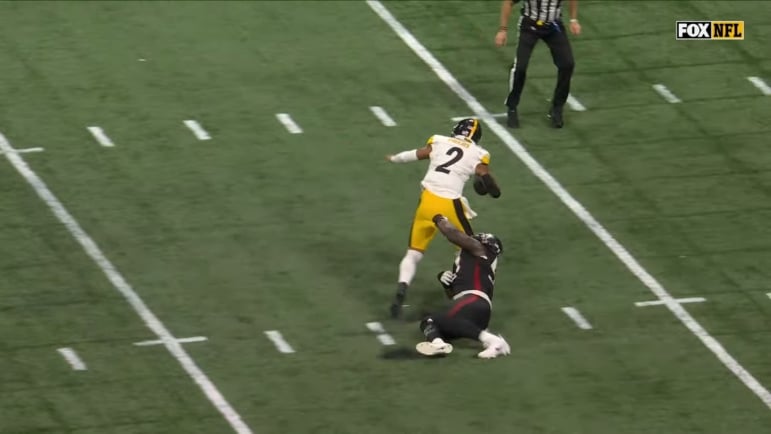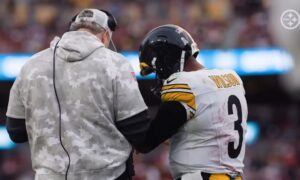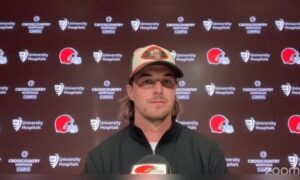Justin Fields played fine against the Atlanta Falcons in the Pittsburgh Steelers’ season opener. He completed 17 of 23 pass attempts for 156 yards with no touchdowns or interceptions. It wasn’t anything special, but it got the job done in an 18-10 Steelers win.
Former NFL quarterback Dan Orlovsky has been a Justin Fields proponent all offseason, harping on the fact that he should be the starting quarterback over Russell Wilson. While all but four of Fields’ pass attempts were over 10 yards from the line of scrimmage, Dan Orlovsky still criticized the quarterback for his struggles in the “quick game” against the Falcons. In a video that he posted on X this morning, Orlovsky breaks down three plays from the Steelers-Falcons game in which Fields’ drop backs and decision making were too slow, preventing easy completions.
“If Fields is going to stay the starter for Pittsburgh, how do they find a quick game and efficient pass game?” Orlovsky said. “I don’t believe that their offense can just line up if Justin’s the guy and run ‘quick game,’ which is three-step catch and throw. They’re going to have to figure out a different way with Justin to get the easy completions schematically and that’s going to fall on Arthur Smith.”
One of Justin Fields’ greatest weaknesses as a passer has been his inability to get the ball out of his hands quickly. With the Chicago Bears, he was consistently near the bottom of the league in average time per pass, ranking dead last among qualified quarterbacks since he entered the league in 2021 taking an average of 3.10 seconds to throw (3.23 in 2023). Fields holding the ball too long combined with the Bears’ horrific offensive line led to a nightmare 137 sacks taken since he entered the league, which is the most of any quarterback (unfortunately Russell Wilson is number two with 133).
The first play Orlovsky highlights was Fields’ first pass attempt of the game, an incompletion on the run to Van Jefferson. In the breakdown, Orlovsky isn’t critiquing the easy missed throw on the run. Instead, he notes that Fields missed a quick out to Darnell Washington on the opposite side of the field as well as the initial quick out to Jefferson.
His slow drop back prevented multiple easy options. Instead the pocket collapsed, and he was forced to make a throw on the run. Fields still had an easy throw that he should have completed to Jefferson after he ditched the pocket and ran to the right. But Orlovsky claims that it never should have happened because the ball should’ve already been out of his hands.
In the next play that Orlovsky reviewed, Fields took a 15-yard sack on third down of the Steelers’ opening drive in the second half. It was an inexcusable sack in which he could’ve delivered the ball to either George Pickens on a curl route at the sticks or Pat Freiermuth on a quick-out route on the other side of the field. Once again, Fields’ drop back was a hair too slow. and he didn’t know where he wanted to go with the football. His indecisiveness and poor footwork turned what should have been a simple first-down throw into a drive-ending sack.
Finally, Orlovsky looked at a third-down play late in the game where Fields held the ball too long and missed an uncovered Calvin Austin III in the slot. In this sequence, Austin runs a curl route and sits a few yards short of the first-down marker with nearly five yards between him and the nearest safety. It could’ve been a quick catch-and-run sequence for the speedster. Instead, Fields waited a tad too long, and the safety was able to jump the pass and force an incompletion. It’s a game of milliseconds, and Fields is consistently a bit too slow.
If Fields is going to win the starting quarterback job, then he needs to be quicker on his drop backs and decisions. Hitting his first read is necessary for the Steelers to generate rhythm in the passing game. The upcoming game against Denver will be his next opportunity to improve in this area, and we’ll see if OC Arthur Smith changes anything schematically to make Fields’ job a bit easier in the quick-passing game.








